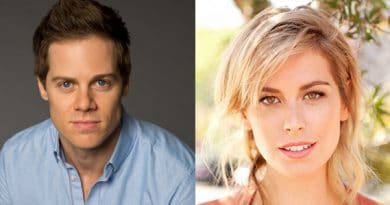Midsumma: corps(e)
Simon Morrison-Baldwin pays loving homage to one of French history’s most overlooked personalities: diplomat, spy, courtier and decorated serviceman Charles-Geneviève-Louise-Auguste-André-Thimothée d’Eon de Beaumont, in corps(e), at The Butterfly Club for Midsumma Festival.

D’Eon, most well-known in their own time for living the first 47 years of their life as a man and the last 34 as a woman, is brought back to life as Morrison-Baldwin treats us to a rare evening’s audience with this truly remarkable figure. Dashing, debonair and stunningly glamorous, D’Eon recounts the trajectory of their long life of intrigue, adventure, triumphs and hardships through war, exile, and personal and social transformation.
Stripping away and reconstructing various layers of clothing, wigs, makeup and facial hair, Morrison-Baldwin explores the fluidity of gender, deconstructing the assumed societal roles of men, women and transgender individuals. Although rejecting any of these labels themselves, D’Eon’s journey is a story of embracing one’s own splendidly complex and indefinable self, which for many, both then and today, transcends arbitrary titles and linear definitions.
The music is well considered and songs range from the poppiest of pop to all-out operatic arias, all of which Morrison-Baldwin commands with his stunning baritone. Solid accompaniment is provided by Robyn Womersley and the pair have no trouble filling the space with an energy befitting that of such a grand character.
With the revival of any historical figure however, especially those with such extraordinary and full lives as D’Eon, there is always the risk of becoming a little too preoccupied with the task of recounting as many historical details as possible, and losing the clarity of the character or narrative amidst a flurry of names, dates and locations. As Mark Twain said, “Never let the facts get in the way of a good story”.
Sadly, corps(e) is incredibly fact heavy, a feature that Morrison-Baldwin acknowledges within the show but sadly makes very little effort countermeasure. Because of this, for the most part the text feels more like Morrison-Baldwin, as himself (albeit in very fine attire), reciting a historical lecture and much sense of D’Eon as a character is lost amidst a barrage of history book rhetoric.
The real shame lies in the fact that with such a little-known historical figure, Morrison-Baldwin had an incredible amount of creative freedom to invent and invest in creating a truly lavish and detailed character portrait that was simply not capitalised on. I can’t help feeling that the show would have benefitted immensely from having the story stripped back to a few key defining moments in D’Eon’s life and allowing the rest to shine through in the vitality and charm of the character.
Despite this, Morrison-Baldwin’s exploration of D’Eon’s story, and especially the social politics attached to it, is a thought-provoking and insightful contribution to Midsumma Festival – a celebration of a vibrant life that embraced queerness and rejected assumed notions of social normalcy in favour of the freedom of a self-determined identity.


